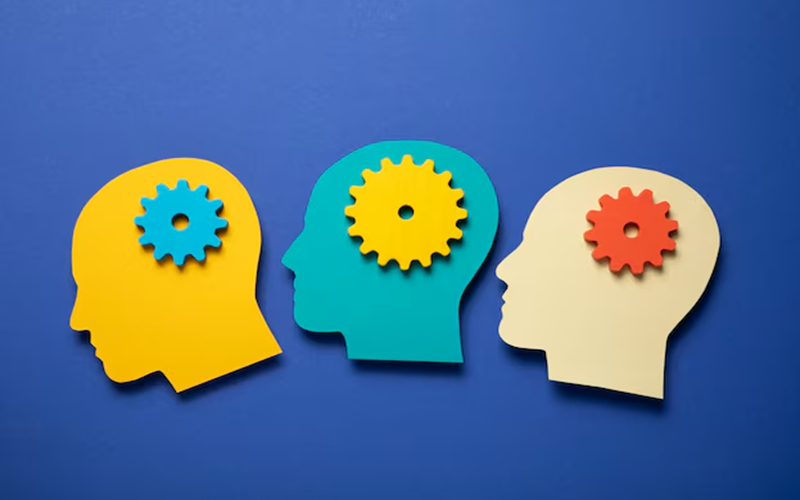Introduction
Human task processing is a multi-faceted process involving a complex interplay of cognitive functions. This paper explores the sequential stages involved in how humans approach and execute tasks, encompassing perception, attention, encoding, planning, execution, monitoring, and learning. Drawing on research from diverse fields, we examine the underlying neural mechanisms, the influence of individual differences, and the role of environmental factors in shaping task performance. We conclude by highlighting the adaptive and dynamic nature of human task processing and its implications for understanding human behaviour
- Hook: Start with a relatable example of a simple task (e.g., making a cup of coffee) and highlight the underlying complexity.
- Introduce the topic: Define what we mean by “task” – a goal-directed activity that requires cognitive effort. Briefly mention that task processing involves multiple cognitive stages.
- State the purpose: Explain the paper’s goal is to provide a framework for understanding how humans process tasks.
- Overview: Mention the cognitive steps that will be discussed (perception to learning).
2. Foundational Cognitive Processes:
- Perception:
- How sensory information is received and processed.
- Role of top-down and bottom-up processing.
- Examples: visual, auditory, tactile input.
- Impact on task initiation: how we notice the task’s presence or requirement.
- Attention:
- Selective focusing on relevant information.
- Types of attention: focused, sustained, divided.
- The attention bottleneck: limitations in processing multiple stimuli simultaneously.
- Implications for task performance: avoiding distractions, maintaining focus.
- Encoding:
- How sensory information is converted into a usable format for storage in memory (both short term and long-term memory).
- Importance of attention in encoding.
- Impact of working memory capacity.
- How initial encoding affects later processing and retrieval.
3. Planning and Decision Making:
- Task analysis:
- Breaking down the task into manageable sub-steps.
- Mental representation of the task and desired outcome.
- Role of knowledge and experience.
- Goal setting and prioritization:
- Defining task objectives.
- Allocating resources based on goals and urgency.
- Balance between competing demands.
- Strategy selection:
- Choosing the appropriate method or procedure for a task.
- Use of heuristics and problem-solving approaches.
- The trade-off between speed and accuracy.
- Decision-making:
- Evaluating options, assessing risks, and making choices.
- Influence of cognitive biases and emotions.
4. Execution and Monitoring:
- Execution:
- Carrying out the intended actions.
- Coordination of motor skills and other relevant abilities.
- Influence of practice and automaticity.
- Performance Monitoring:
- Evaluating progress towards the goal.
- Detecting errors and adjusting actions.
- The role of metacognition in self-monitoring.
- Feedback loops in the process of task execution.
5. Learning and Adaptation:
- Feedback and Error Correction:
- Using performance feedback to improve future attempts.
- Identifying and correcting errors.
- The role of reinforcement and punishment.
- Skill Acquisition:
- Moving from novice to expert behavior.
- Development of automaticity.
- Long-term memory consolidation of task-related information.
- Task Modification:
- Adapting strategies based on changing task demands.
- Flexibility and transfer of learning.
- The ability to learn new strategies.
6. The Neural Basis of Task Processing:
- Brain Regions Involved:
- Prefrontal cortex: planning, decision-making, working memory.
- Parietal cortex: attention, spatial awareness.
- Motor cortex: execution of actions.
- Basal ganglia: habit formation and automatic skills.
- Limbic system: emotions and motivation.
- Neural Networks:
- Connectivity and communication between brain regions.
- Dynamic neural changes during learning.
- Neurotransmitters:
- Dopamine, serotonin, and their roles in motivation, attention, and cognitive control.
- Variations in neurotransmitter levels influencing task performance.
7. Individual Differences and Context:
- Cognitive Abilities:
- Impact of working memory capacity, processing speed, and attention resources.
- Variations related to age, experience, and health conditions.
- Personality and Motivation:
- How personality traits influence preference of certain strategies and task performance.
- Role of motivation and goals.
- Environmental Factors:
- Influence of distractions, time pressure, and stress.
- The impact of context on task perception, execution, and learning.
8. Conclusion:
- Recap: Summarize the key stages in task processing.
- Emphasis: Reiterate the adaptive and dynamic nature of human task processing; it’s a flexible process that can be adjusted based on the needs of the task and the environment.
- Implications: Discuss the implications for broader understanding of human behavior, learning, performance, and cognitive health.
- Future Research: Suggest avenues for further investigation.
Key Considerations for Writing:
- Use Clear and Concise Language: Avoid jargon where possible or define it clearly.
- Provide Examples: Illustrate abstract concepts with concrete examples.
- Draw on Evidence: Support claims with references to research in psychology, neuroscience, and other relevant fields.
- Maintain a Logical Flow: Ensure each section builds on the previous one.
- Be Critical: Acknowledge limitations in the current understanding and note areas in need of further research.
Potential Research Sources:
- Psychological Journals: Psychological Review, Journal of Experimental Psychology, Cognitive Psychology, Psychological Science.
- Neuroscience Journals: Nature Neuroscience, Neuron, Journal of Neuroscience.
- Cognitive Science Journals: Cognitive Science, Trends in Cognitive Sciences.
- Textbooks: Cognitive Psychology textbooks, Neuroscience textbooks.



















+ There are no comments
Add yours